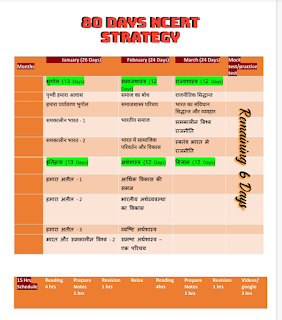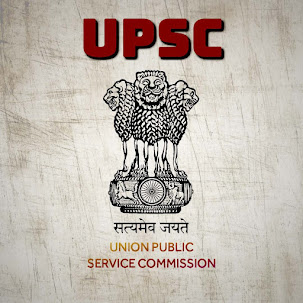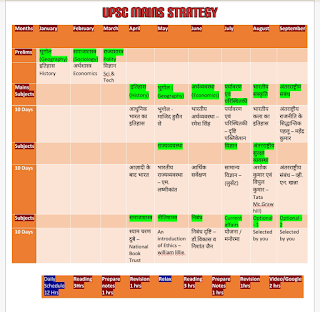UPSC - Union Public Service Commission
UPSC means Union Public Service Commission which conducts exam for Central posts every year. It is considered one of the toughest exams in the country. In this, the exam is taken for more than 24 posts. Talking about the exam, the wag is taken in three stages, prelims, mains, interviews. The exam is taken in OFFLINE mode.
Examination rules and criteria have been set as per the examination. Let us
tell you in detail about UPSC exam today and also in detail how you can prepare
for this exam and learn and clear it, so from the beginning to the end of UPSC
strategy, today we will tell you. Let's know, how to and what to learn for
creative UPSC success.
What is the UPSC exam?
Talking about UPSC exams,
there are 3 exams in total, prelims, mains, interviews. This exam is taken in
offline mode in selected centres across the country. Only after clearing the
prelims exam, the applicant can apply for the mains. And one of the prelims is
given by Mark Criteria UPSC.
UPSC Prelims Exam and Pattern
It mainly consists of 2
papers in total. Compulsory is the first General Studies Paper 1 and CSAT
qualifying. Meaning whatever its merits are, they will not be counted in the
final marks but it is necessary to clear the exam by taking the merit according
to the requirement of the student, only then he will be able to take the stage
2 i.e mains exam.
All the questions in
Prelims are objective ie MCQ pattern. (i.e 1 question 4 options)
Exams are mainly in Hindi and
English in both languages. But in the mains, you will have questions in Hindi
and English but you can solve them in your native language or any knowledgeable
language.
Prelims total paper 1 and
paper 2 together with a total of 400 marks. 2 hrs is given for each paper.
Paper 1 consists of 100 questions and Paper 2 consists of 80 questions.
The most important prelims
have a negative marking scheme, in Paper 1 you will be deducted 0.33 marks on
each of your wrong answers and in Paper 2, 0.83 marks will be deducted on each
wrong answer.
You must score 33% to qualify
for prelims.
UPSC Mains Exam And Pattern
There are a total of 9 papers
in which 2 papers are qualifying and 7 papers are merit-based. And all the
papers are descriptive ie pen-paper based, you have to answer every question in
written format and not any options.
Paper A and Paper B in UPSC
mains are called qualifying paper which is of 300 marks per paper and is of
3hrs. All the remaining fertilized papers are of 250 marks and 3 hrs time.
There is no negative marking. UPSC continues to declare it's cutoff category
wise every year.
UPSC INTERVIEW
All the students who clear
UPSC mains are called for an interview. The interview is of 275 marks.
UPSC ALL POSTS / TOTAL POSTS
Indian Administrative Service
or IAS
Indian Foreign Service
or IFS
Indian Police Service
or IPS
Indian Finance Service
Indian Audit and
Accounts Service
Indian Revenue Service
(Customs and Central Excise)
Indian Defence Accounts
Service
Indian Revenue Service
(I.T.) or IRS
IOF Service (Assistant
Works Manager, Administration)
Indian Postal Service
Indian Civil Accounts
Service
Indian Railway Traffic
Service
Indian Railway Accounts
Service
Indian Railway
Personnel Service
Indian Railway
Protection Force (Assistant Security Commissioner)
Indian Defence Estates
Service
Indian Information
Service (Junior Grade)
Indian Trade Service,
Group 'A' (Gr. III)
Indian Corporate Law
Service
AFH Civil Service
Delhi,
A & N Islands,
Lakshadweep, Daman & Diu, and DANICS Delhi,
Andaman & Nicobar
Island Police Service
Pondicherry Civil Service
Pondicherry Police
Service
UPSC STUDY MATERIAL (HINDI MEDIUM)
Prelims + Mains + Interview
History
NCERT (6th - 12th std)
Prachin Bharat - 11th
std
Madhyakalin Bharat -
12th std (Satish Chandra)
Adhunik Bharat - 12th
std (Bipin Chandra)
Adhunik Bharat ka Itihas
(Spectrum)
Azadi ke baad Bharat
(Bipin Chandra)
Geography
NCERT (6th - 12th
std)
Bharat Bhautik
paryavaran, Bhautik Bhugol ke mul Siddhanta - 11th std
Bharat log aur
arthvyavastha, Manav bhugol ke mul siddhant - 12th std
World Geography (NCERT
6th - 8th std)
Bhugol - Majid
Hussain/Mahesh Warnwal
Indian Polity
Bhartiya Rajyavyavstha - M.
Laxmikant
Bhartiya Shashan -
M.Laxmikant
Economics
NCERT (9th - 12th std)
Bhartiya Arthvyavastha
- Ramesh Singh/Laal and laal
Arthik Sarvekshan aur
mrunal videos
Environment and Ecology
Paristitiki evam Paryavaran -
Drushti Publication
Science and Technology
NCERT (6th - 10th std)
Samanya Vigyan -
Lucents
BOOKLIST - 2
Indian Culture
Pushpa vishtha Sinha
Notes
Bhartiya Kala ka Itihas
(Fine Arts)
Internal Security
Ashok Kumar evam Vipul
- Tata Mc Graw Hill
International
Relation
Antarrashtriya Rajniti
ke sidhhantik pahlu - Mahendra Kumar
Antarrashtriya sambandha -
V.N Khanna/Rajesh Mishra
Sociology
NCERT (11th - 12th std)
Sociology - Shyam
Charan Dube (National Book Trust)
Ram Ahuja
Ethics (Nitishashtra)
NCERT (Psychology -
11th and 12th std)
Akhbar ke sampadkiya
prushth se Kuch acche lekh
Essay writing (Nibandh)
Nibandh drushti (Dr.
Vikas v Nishant Jain)
Current Affairs
Newspaper
English - The Hindu
The Indian Express
Hindi - Dainik Jagran
Business standard
Magazines
Yojana
Kurukshetra
Drushti current Affairs
Chronicle
VISION IAS
Websites
Radio/TV
DD News
Akashwani
Loksabha/Rajyasabha
UPSC STUDY MATERIAL (FOR MARATHI MEDIUM)
GS - 1
History
NCERT - (6th - 12th
std)
Ancient India (Marathi)
- R.S. Sharma (K.sagar publication)
Adhunik Bhartacha
Ithihas (Marathi) - grovar and belhekar
India's struggle for
independence (Marathi) - Bipin Chandra
India After
Independence (Marathi) - Bipin Chandra
Adhunik jagacha itihas
- Jain and Mathur (Marathi)
Sociology
NCERT (Sociology) - (11th -
12th std)
Samajshashtracha
Parichay - Dr.Jyoti Gagangras / Dr. Sudhir yewle
NGO Reports
Chalu Ghadamodi
Bhugol
G.C Leong - Physical
and Human Geography
NCERT Geography - (6th
- 12th std)
ATLAS
GS - 2
NCERT (Political Science) -
(6th - 12th std)
Political science -
M.Laxmikant
Bhartiya Rajyaghatna -
Tukaram Jadhav
Rajyasabha TV Debates
Governance - Youtube
videos by Mrunal Patel
Bhartache parrashtra
dhoran - Shailendra Devalankar
Chalu Ghadamodi
(Newspaper)
GS - 3
NCERT (Economics) - (9th -
12th std)
Economic survey and
Budget
Newspaper
Bhartiya arthvyavastha
- Ranjan kolambe
Indian Economy - Ramesh
Singh
Rajyasabha TV Debates
GS - 4
Paryavaran paristhitiki -
Tushar Ghorpade
Shankar IAS Environment
Biology (12th std last
4 chapters)
NCERT (science) - (6th
- 12th std)
Internal security -
Ashok Kumar
GS - 5
Ethics, Integrity and
Aptitude - Chronicle
Ethics - Mrunal videos
UPSC STUDY MATERIAL (ENGLISH MEDIUM)
Prelims study material
Paper - 1
India's Struggle for
Independence - Bipan Chandra
NCERT - (Modern India
old book)
NCERT Geography - (10th
- 12th std)
Geography of India -
Gopal Singh
Certificate Physical
and Human Geography - G.C.Leong
Our Constitution -
Shubhash Kashyap
Our Parliament -
Shubhash Kashyap
Constitution of India -
D.D.Basu
NCERT - Economic
development of India
Indian Economy - Dutta
Sundaram/Mishra puri
Economic Survey of
India
science Reporter
Science NCERT - (6th -
10th std)
Magazines - Chronicle,
wizard, frontline, Yojana
Prithvi Notes and
Exercises
Paper - 2
Quantitative attitude - R.S
Agrawal
Reasoning - R.S Agrawal
Highschool Grammer and
comprehension - Pal and Suri/ Wrein Martin
NCERT (Maths + geometry) -
(8th - 10th)
NDA, CDS past year
Question paper
UPSC Mains
GS - 1
NCERT - Geography, History,
sociology
Wonder than was India -
A.L. Bashan
Modern India - Sumit
sarkar
World history -
L.N.Mukherjee
Geography of India -
Khullar
Certificate Physical
and Human Geography - G.C Leong
Human geography - Majid
Hussain
GS - 2
Polity and governance -
M.Laxmikant
Wizards Indian polity
and constitution
Our constitution -
Subhash Kashyap
Our Parliament -
Subhash Kashyap
Constitution of India -
D.D Basu
The Hindu, Frontline,
Yojana etc.
Indian foreign polity -
V.P. Dutt
World focus , frontline
EPW Magazines
GS - 3
Internal Security in
India - Bajpai
Envisioning an
Empowered Nation - APJ.Abdul Kalam
Indian Economy - Dutta
Sundaram/Mishra and Puri
Economic Survey of
India
Science Reporter
GS - 4
Ethics, Integrity and
Aptitude - Sqn. LDR.Shashikant shetye ( Prithvi publication)
An Introduction of
ethics - William Lillie
BEST 7 TIPS FOR UPSC PREPARATION WITHOUT COACHING
● Read and understand Syllabus thoroughly.
● Preparation from the quality and best books only.
● Daily revision and make notes
● Take Support from YouTube videos or google to clear reference or doubt.
● Watch and read the toppers' interviews/blogs.
● Make a planned timetable of your studies and follow it under any circumstances.
● Focus on mains more than prelims and practice writing more and more.
UPSC strategy / Timetable for NCERT Preparation
 |
| 80 DAYS NCERT TIMETABLE |
UPSC strategy / Timetable for Mains Preparation
FREQUENTLY ASKED QUESTIONS
1) How can I start preparation for UPSC 2021?
The most important thing for UPSC is that you should be
consistent and hard work, make your strategy for UPSC 2021 preparation first,
arrange the books according to the syllabus, and study days with a perfect
scheduled. For how you can do without UPSC Preparation Coaching, you can take
help of the strategies given in our post.
2) can I prepare for UPSC without coaching?
Yes, you can clear UPSC without coaching too, for this a
perfect timetable, books and hard work are needed.
3) How can I crack UPSC in the first attempt without coaching?
If you have to clear UPSC in Coaching First Attempt then you
must prepare a minimum of 12 months (1 year), from the very beginning you
should start studying for UPSC mains.
4) Which NCERT Books to read for IAS?
NCERT books are considered as the foundation for UPSC, out
of which all NCERT books of class 6th to class 12th are the best for UPSC.
5) Can I clear UPSC in 6 Months?
Yes, but you need to have basic knowledge in it, like NCERT,
if you have already read NCERT well, then by giving 6 months maximum time and
with full hard work, you can clear UPSC.
6) How many hours of study is required for UPSC?
It doesn't matter whether you spend more time or less time,
how you study is important, but in the beginning, study 2 hrs revision of
minimum 8 hrs can be called the best time, for preparation.
7) Can I clear IAS in 1 year?
Yes, with hard work and the proper way you can clear UPSC
IAS in 1 year.
8) Does coaching helps in UPSC?
A little yes, because the guidance of Experience Teachers in
coaching helps you to further improve the UPSC study.
9) Are coaching notes enough for UPSC?
No, your UPSC cannot be fully prepared by any paid notes or
coaching notes, in which only your notes can give you successful results.
10) How to apply for UPSC free coaching?
There are many such government coaches across the country
which provide free coaching and scholarship of UPSC to the Talented students.
for example YASHADA.


